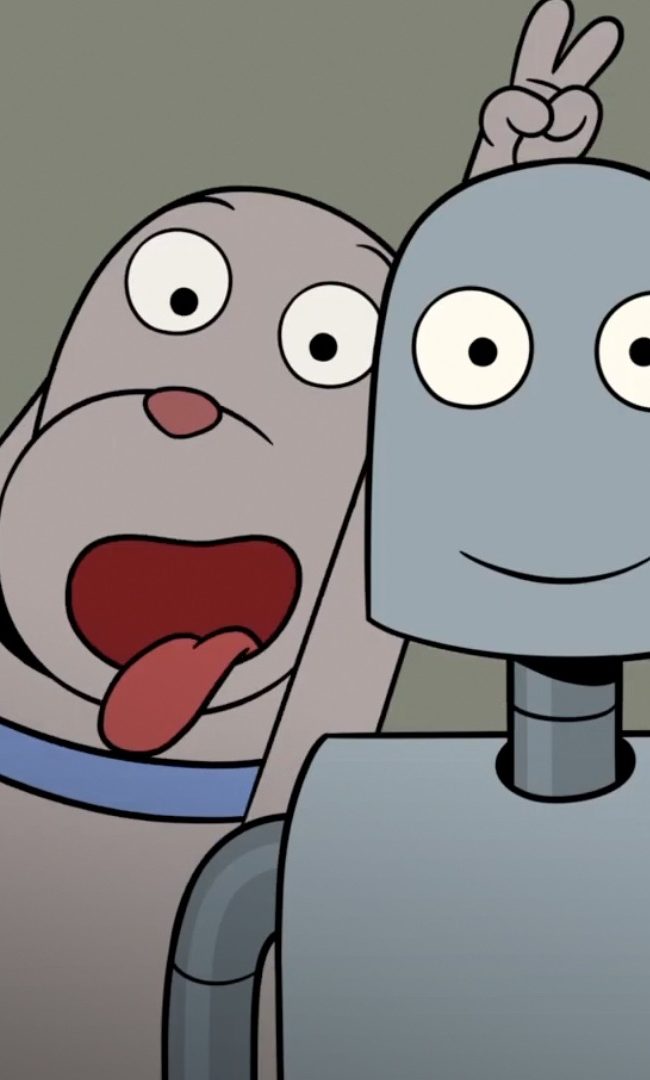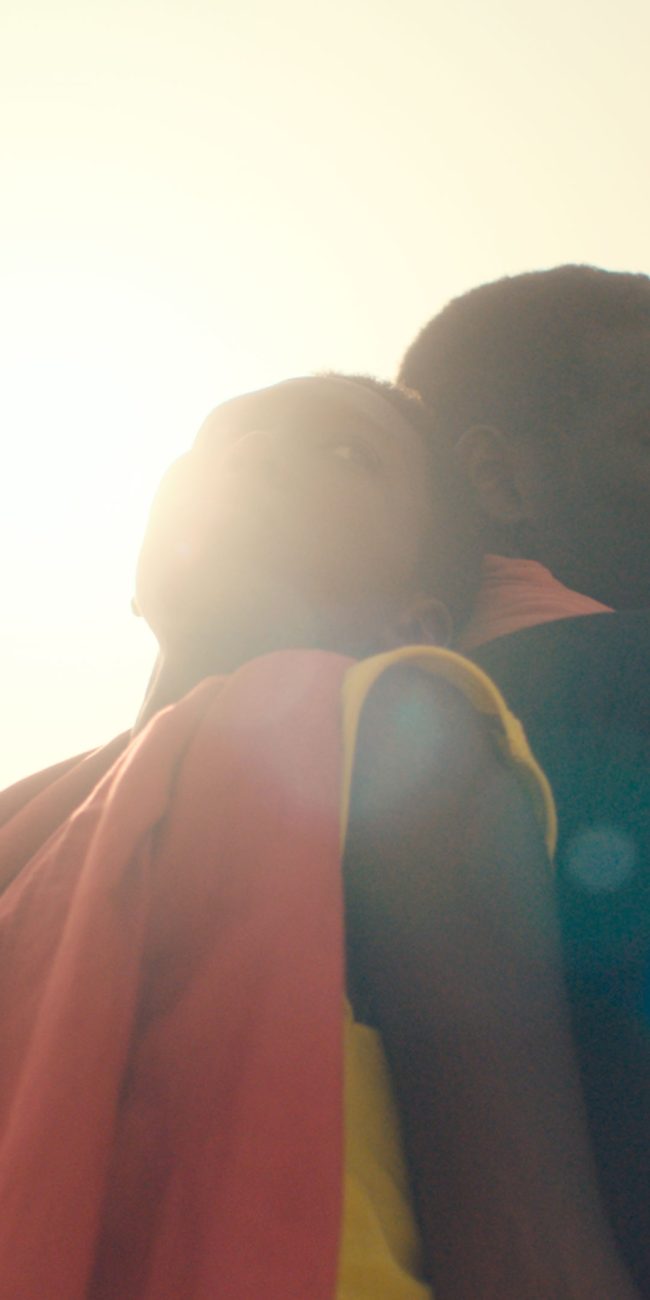A Conversation with Chris Wilcha (FLIPSIDE)
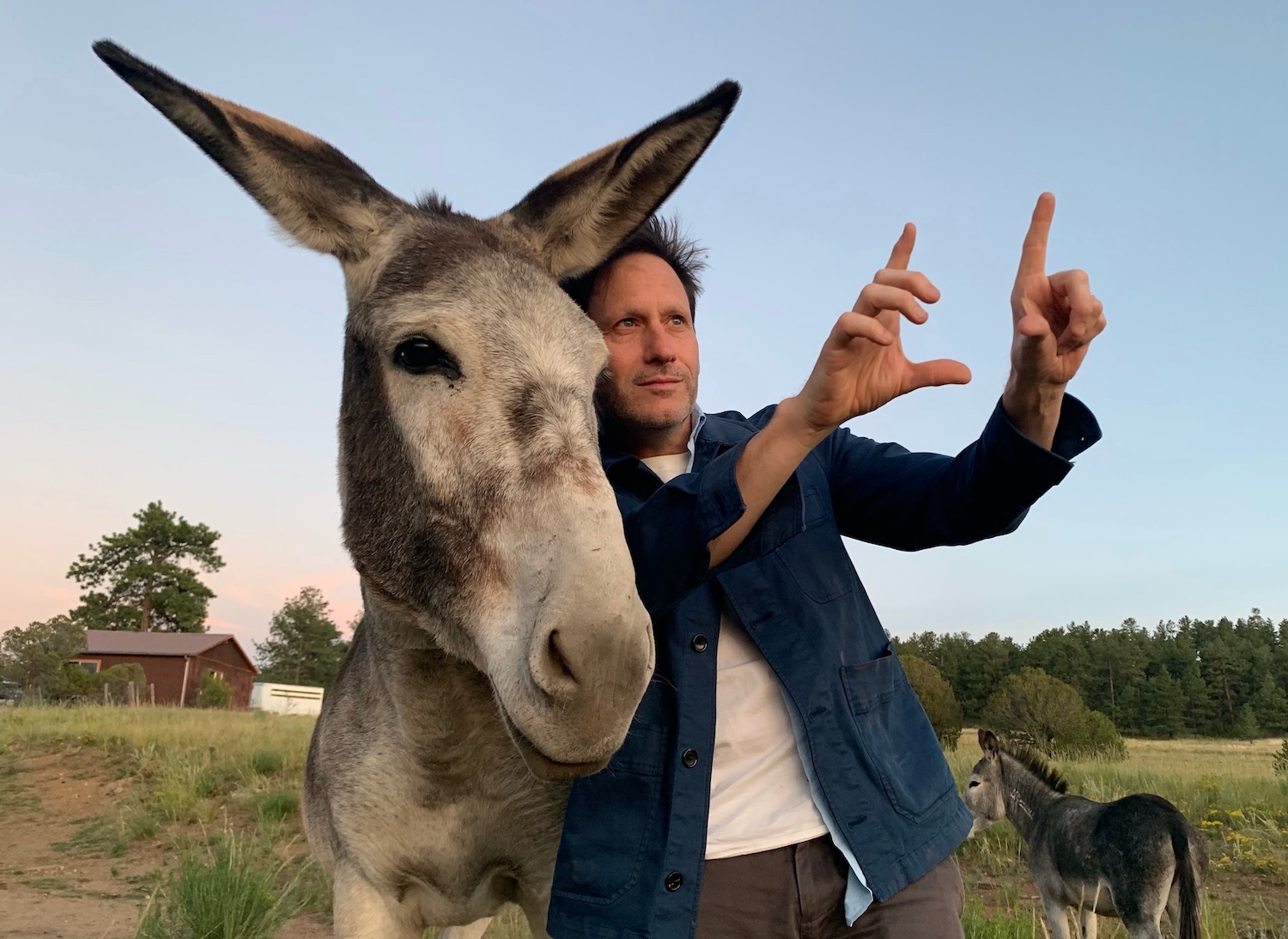
Filmmaker Chris Wilcha has long struggled with the feeling that his most creative days are behind him, stuck as he is in the world of commercial work-for-hire. But a funny thing happened along the way towards middle-aged professional dissatisfaction: the personal-essay film Flipside, which premiered at the 2023 Toronto International Film Festival (TIFF), where I reviewed it. The movie is a fascinating look at the life of an artist, as well as the lives of all who pursue their passions. At the center is the titular record store in Pompton Lakes, NJ, but there are many more subjects than that. Wilcha and I chatted at TIFF, and now here is that interview, edited for length and clarity.
Hammer to Nail: Chris, as you make clear in the movie, you have long had many unfinished projects…
Chris Wilcha: Yes.
HtN: …sitting around on various hard drives.
CW: God, yes. (groans and laughs)
HtN: So at what point, in looking through all this footage and thinking about Flipside Records, did you first start to get an inkling that you could put it all together in a film like this?
CW: So, I’d been going back to this record store in New Jersey and shooting periodically every couple of years. And I was holding this idea in my mind that there was a film there. I didn’t think there was a film that could sustain a story that was just about that record store. I knew that instinctively. And I wasn’t interested in making something like, “This place is great! Let’s interview old employees.”
And as many of us were doing during the pandemic, I was back in old hard drives, back in old scrapbooks, maybe printing out old photos, transferring things, and I was looking at all this old material that I’d accumulated, and I felt this intense sense of “if I don’t make this Flipside project now, I don’t think I will ever do it.” Because it’s a labor-intensive film, in the sense of going through all this archival material.
And another thing informed it, which was this group of people I’d been working with, who oftentimes were looking for money and were trying to fund projects, which is really challenging in the idea stage. And what I found with Flipside was that I wrote a treatment and I would show it to people and on paper, they would go: “I don’t understand what this is. I don’t know the vibe. I can’t understand the tone. There are too many ideas.” It wasn’t intriguing people as a written treatment. They all said they needed to see something.
So this group of collaborators—an editor I work with named Joe Beshenkovsky and two producers, Alex Fisch and Michelle Currinder—said: “Let’s just use our own resources. We’ll try to make this ourselves. Try to make a standalone thing, or at least get a cut of it.” And it was that moment when I got some people whose belief in it was more defined. And then it was the digging in and saying, “This works, this doesn’t.” There were other abandoned projects that never made it in. This was the stuff that carried the big ideas.
HtN: Speaking of those hard drives, did you discover, in returning to them, that any of them had degraded? As you know, when you leave hard drives sitting around for a while, they can eventually stop working. They don’t last forever. Did you have projects where the footage was lost?
CW: We had many media crises, and my editor and my post-production team are still mad at me. For instance, there’s a subject in the movie named Herman Leonard, and we had this footage from an Avid project. And I brought it over to our team—and this stuff was from 2009 and 2010, so here we are, 10, 12 years later—and my editor, Joe Beshenkovsky, keeps saying, “This is an Avid project file, these are not the masters.”
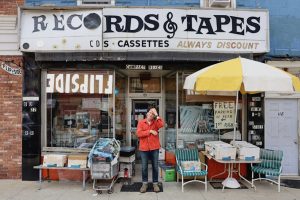
A still from FLIPSIDE
And so I was hunting, digging, on Amazon ordering dongles upon dongles and I found about 60% of the masters, meaning shot on the day, from the camera, high resolution. There is an entire chunk of stuff from the Herman Leonard footage that was on DVCAM, and the post-production facility where I first took it and digitized it went out of business as a result of COVID. I begged them, but they said, “No! We gave those back to you.” I could not find these 7 MiniDV tapes. Se we had to up-res Avid file projects and it’s degraded. It doesn’t look as sharp. And I’m still convinced that I will find the missing tapes. This film is still a living, breathing thing. We do not yet have a distributor, it’s self-financed. So my dream is that I will still continue to dig stuff up and fill in some of the blanks.
There’s footage of Ira Glass that we had on a hard drive. It was in New York. We shipped it to L.A. to get it ingested and they said it’s all corrupted. The hard drive got screwed up in transit. So we then had to do overnight uploads. It was a media-management mess. And everyone hates my guts for it. I’m serious. It was brutal.
HtN: I run a university film program and I’m always trying to sell my students on the need for storage redundancy, and so this would be a great case study. But even then, if you wait long enough, it doesn’t matter if you have it copied to 2 or 3 hard drives, they could all be degraded. So I feel your pain.
Speaking of Herman Leonard, when did you land on using him as your guide? You return to him so often that he becomes the film’s moral compass. When did you decide to use him in that way?
CW: It was very depressing to me that I had shot this material about this guy and that he died and that it would never see the light of day. And I think his family was disappointed that we’d spent time shooting with him and then did nothing. They asked, “Is there going to be an ‘American Masters’ on him?” And I would answer, “I don’t have enough. I don’t have the material do a feature-length film.”
So when this new idea started to cohere, that maybe we could have these case studies within the film, that we could have these mini-documentaries within the documentary, we started moving the puzzle pieces around, and my editor, Joe Beshenkovsky, cut this little cold intro piece. It’s not really specific—you don’t learn a lot about who Herman is—but it’s a little elliptical, a little philosophical, and it sets the tone in a reflective way. When he parked that at the beginning, and then we figured out that his voice could start recurring throughout and we had just enough material to support his reintroduction at periodic moments, that was when we went, “Oh, this algorithm can work.”
So then we started to figure out how to introduce David Milch, and then have him recur. And then, how do we introduce this woman Starlee, who had a crisis of confidence about writing a book, and then maybe have her recur. And so it was that Herman Leonard cracked the code on the recurring voice, and we had more material with him than with the others, so he became this accidental kind of hovering guru. He was also the person whose life had ended within the trajectory of the movie, so it seemed appropriate to do that with him. It’s also kind of like this “exquisite corpse” of lives: a person in their 40s, a person in their 50s, a person in their 60s. It’s almost like this weird examination of the arc of a life.
HtN: And then with David Milch, you have the additional arc of his dementia.
CW: And that was really intense. So much of what we’re talking about is memory and what do you keep and what do you leave behind. And David was such an evangelical presence. His energy was so intense when you were around him. Writing, to him, was a religion. And then to be around him now and to see him losing his memory was so moving and sad. A little moment, for me, that always raises the hair on the back of my neck is that he sent me out to film Herman Leonard, with really no larger goal of there actually being a film. It was an act of pure generosity to bestow a documentary crew on this guy and give him that attention. And there we were, 10 years later, photographing David Milch, and it was kind of a big deal for him that day at his living facility. We showed up and everyone knew we were coming to interview David and it was this moment where he was being seen, too. The echo of that was really meaningful to me.
HtN: I have always been a big Deadwood fan. I know he has written lots of other stuff, but whenever I think of David Milch, I think of Deadwood, and the many, many obscenities uttered by everybody in the series.
CW: Yes! (laughs)
HtN: So, how is Flipside Records doing now? How is the owner, Dan, doing?
CW: Flipside is…surviving. I don’t want to say it’s thriving. I don’t think he had a great Christmas last year. He just replaced the sign. To me, my dream, if this film has any form of distribution or connects with other music nerds or vinyl aficionados, is that such folks might make some kind of pilgrimage there and say, “I saw the documentary, I’m here to spend $100.” (laughs) I would love nothing more than for this to give him a little infusion of interest and business.
HtN: And how about Station 1, that rival store? Are they still around?
CW: Station 1 is booming. They’re doing great! They are such an ecosystem. They tell me they cannot keep the vinyl on the shelf. They literally are out looking for new collections constantly and cannot replenish their inventory fast enough. And a lot of the buyers are these younger kids, who are like 13, 15, 18. Business is booming!
HtN: My only parallel to Flipside, since I don’t frequent record stores as I did when I was a kid, is bookstores. And I love walking into ramshackle used bookstores, where it’s really hard to find things. It’s a nice vibe. But…I can understand that being too much for people, some of whom might prefer the cleaner vibe of Station 1. I get it.
CW: And I think that’s partly generational, because with crate-digging, you get filthy, you’re moving things, you have to dig, you have to sift. It takes time. You’re not looking for something you want; you’re trying to discover something you didn’t know existed. It’s a whole different way of shopping.
I brought my daughter in there. She’s 17. And she is paralyzed. She’s like, “I don’t even know how to engage this.” She’s used to using a search engine. The thing comes up: Taylor Swift, color vinyl, three different sources, ordered, done. And so I think there is a real appeal to the younger people who shop at Station 1 to walk in, look at the new releases, they’re in and they’re out. They do not have 3 hours, 4 hours, 5 hours on a Saturday afternoon to go crate-digging.
HtN: I hadn’t heard the term “crate-digging” before, but I like it a lot.
CW: I think it’s a DJ thing. You’re “digging through the crates” to try to find that obscure break beat that’s on some jazz album from the ‘70s that nobody’s heard. Now, of course digital life has made it so that all those things are now ubiquitous and exposed and revealed. And apparently, a lot of my musician friends have told me that AI is going to be a legal nightmare, because so many people will sample a snare hit from an obscure funk album, and the AI can now find that. So all the mixing and matching and the secret story of sampling that is unprovable right now, AI is going to blow the cover off of, apparently. That’s what my friends tell me.
HtN: It is a brave new world. So, I love your inclusion of Judd Apatow here, and I especially like the phone conversation with your mom. Did you have to talk him into that? He seems like a guy who can take it all. But how did you set that up?
CW: So, I had wanted to interview Judd for this, because I had done a project for him that didn’t have a particularly robust life. And I had actually felt kind of bad about it. And this didn’t make it into the film, but I kind of wanted to check with him that he still remembered that as a good experience and didn’t think of me as an incompetent nitwit. And lo and behold, he had fond memories, but it’s true that that was kind of an obscure thing that just ended up as a DVD extra.
And I thought about warning him beforehand and saying, “Hey, I want to do this thing where we FaceTime my mother,” but then I thought, “That’s going to rob it of spontaneity.” He’s so light on his feet, and he’s so smart and funny. I didn’t think he was going to be fazed by it. And if he was, we’d cut it out. So lo and behold, mid-interview, I said: “You know, I moved to Los Angeles at your behest, to work for you, and I haven’t left, and for my mother, this is a traumatic moment in her life. This is when her grandchildren were taken from the East Coast and now live in California and she sees them twice a year.”
And then I asked him if he would mind if we FaceTimed with Pat Wilcha. And he’s like, “Sure!” And then the funniest thing happens, which is that my mom felt totally ambushed, even though I told her exactly when we’d be calling. But he played along, and she said some biting things, but I think, ultimately, by the end, there was love in the room.
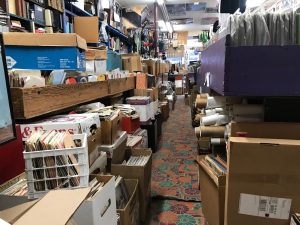
Flipside Records in Pompton Lakes, NJ
HtN: I love your sidebar with Uncle Floyd. What’s going on with him now?
CW: Uncle Floyd continues to perform and he is just a working musician. Neither he nor his manager have seen the documentary yet, but they were game to participate. He came and shot with us a couple times. But, you know, he says he is on the “hot-stove circuit.” He plays weddings, he plays restaurants, he plays conventions, funeral-parlor conventions as he says in the film. This is his living, he’s hustling those things.
One of the things he’s been doing, which was kind of a pandemic thing, is he started to host something on Zoom where he will show old episodes of his show, and fans come on and they pay a ticket price to sit for an afternoon while he narrates what was going on, and then they watch a portion of the show. That’s been a little income source. He is on the freelance grind, like all of us. He’s just trying to make a go of it and he’s continuing to do his thing.
He is also not particularly interested, I think, in the nostalgia of Uncle Floyd. That was more my interest; he was not interested. I don’t know if you noticed, but I don’t really interview him about the Uncle Floyd days. He didn’t seem too interested in talking about that, but he was OK to talk about life as a working musician.
HtN: Well maybe this film will give him renewed attention, just as you hope it might to Flipside Records.
CW: I hope so. My dream for Floyd is that we have a New York screening and he’s up there on stage, playing. I would love nothing more than for this to get Flipside some attention, for this to get Uncle Floyd some attention. That would be so meaningful.
HtN: I realize you talk about this in the film, but now that the process is done—even though you say the movie is still a living-breathing thing—do you feel that making the film rejuvenated you and made these different threads of your life come together in a meaningful way, reconciling you to the paths you took?
CW: You are catching me at a really interesting moment, which is when so few people have seen the film. It was done just 10 or 15 days ago. But I feel addicted to the feeling of having made this, to be reminded of what it feels like to make work that is meaningful, where the personal stakes for you are much higher, where you want it to connect with people. It’s not just a job-for-hire, where you clock in and clock out.
And what I’m already feeling a preemptive despair about is that the little machine we built—my editor was working full-time, I was co-writing it with a friend, he was also composing the music, there was a kind of creative fire that was just burning—is already idling down because the project is over. And I’m like, “Guys, let’s do the next one.” We all feel that there’s other content here, other things that could spin off of this.
I had originally wanted to do this as maybe a series of half-hours, where you do a David Milch episode, or an Uncle Floyd episode, and I feel really good about the length of those things; they don’t overstay their welcome. You get just enough of Milch, just enough of Herman Leonard. But I think there are still Gen X stories left to tell, so I do feel super-rejuvenated.
My editor was joking that the director credit that appears right at the end when the music kicks in is like a plot point. (laughs) Because the fact that the movie is done is the final puzzle piece that falls into place. That was the dream of the algorithm of the movie, that it finishes itself and that all the wanderings and digressions and all the confusion and doubt cohere into one final thought.
HtN: Thank you so much for making this film and thank you for talking to me.
CW: Thank you so profoundly for your attention and interest and your thoughtful response to it. It means a lot.
– Christopher Llewellyn Reed (@ChrisReedFilm)








